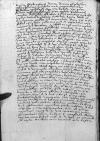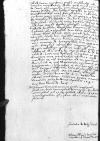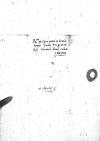⌊Psitacum⌋ revolasse iam non dubito, per quem videor mihi significasse, quem exitum habuerint comitia. Discessum est enim rebus omnibus infectis, postea tamen vasarium tributum regiae maiestatis et episcoporum oppidis est imperatum. Quae res male habet equestrem ordinem, quod id absentibus eius nuntiis est decretum. Excitabit ea res novos motus in iis, quae proxime habebuntur, comitiis.
Diem de causa caduci Lysmanovae dictum esse comperendinatum facile fert ⌊reverendissimus dominus⌋. Concedat Deus exitum huius causae felicem. Litterae de praefectura Sluchoviensi lectae sunt per ⌊reverendissimum dominum⌋ diligenter serenissimae ⌊maiestati regiae⌋
, cum non pauci senatores praesentes adessent. Neque enim ut secreto legerentur, Reverendissima Dominatio Vestra mandaverat. Sed ut audivi ex Reverendissimo Domino, simul atque lectae sunt, dominus ⌊Soboczki⌋ post festum venisse litteras dixit. Cumque ageret de dilatione ⌊reverendissimus dominus⌋, tum ille datas esse litteras domino ⌊palatino Posnaniensi⌋ dixit, ut simul ac postulasset in bonorum Sluchoviensium possessionem se mitti, mitteretur evestigio. Contrarias dari a ⌊reverendissimo domino⌋ non licuit, cum praesertim, ut contra mandaret aliquid, adduci ⌊maiestas regia⌋ non potuerit. Sed illud sciat Reverendissima Dominatio Vestra graviter admodum tulisse ⌊maiestatem regiam iuniorem⌋, quod istae praefecturae datae aliis sunt quam Prutenis; ita ut ego non omnino desperem posse adhuc aliquid profici. Litteras illas commendaticias accepi; una et schedam in litteris domini praepositi: quam cum legerem, satis mirari non potui, quomodo in litteras domini ⌊praepositi⌋ incidisset; ac, ut verum fatear, non prius intellexi, quid sibi scheda vellet, quam has legissem a ⌊Mauricio⌋⌊⌋ allatas.
De ⌊Alexandro⌋ quae acceperim, scripsi Reverendissimae Dominationi Vestrae. Liber est et negotium hominibus facessit. Triumviratum istum divitem esse oportet, qui tot oppidorum et villarum proventus sibi omnes vindicat, nulla fratrum absentium quidem, sed bene de se nihilominus merentium, habita ratione. Dolet mihi haec eorum inhumanitas. Cum ad aulam appulerit nepos Reverendissimae Dominationis Vestrae, quaecumque potero humanitatis officia lubens ei praestabo. Quam causam commendat mihi Reverendissima Dominatio Vestra, ea cuiusmodi sit, nescio: nondum enim vacavit acta legere. Illud tamen impetrari posse confido, ut ad comitia remittatur.
Nova, quae misit mihi Reverendissima Dominatio Vestra, etsi oracula non sunt, fuerunt mihi tamen grata. De ⌊Lutero⌋ mortuo in ipsis Bacchanalibus erat huc allatum. Ceterum certiora nova misi per dominum ⌊Ioannem a Werd[en]⌋ de ⌊concilio⌋ Tridentino[1]. De verbo suscepto ve[rba] data sunt. Suscepit enim verbum ⌊regia maiestas⌋, sed iam annus agitur fortassis octogesimus. Illud verbum baptismi tempore susceptum retinet et retinebit, Deo bene iuvante, etiam serenissimus ⌊filius⌋ eius, quoad vita fuerit utrique superstes, invitis omnibus portis inferorum.
Quam domum optasse dicitur meo nomine dominus ⌊praepositus⌋, eam ego non opto. Sumptus enim hic magnos facio, neque intelligo, quid ea mihi sit opus, cu[m] absim ab illa ecclesia. Ago gratias Reverendissimae Dominationi Vestr[ae], quod domino ⌊Locca⌋ non defuerit. Cupiebam et ego i[lli] cantoriae meae proventus mittere, sed nondum ex eis quicquam ad me pervenit. Quaesivit ex me ⌊Mauricius⌋, cui daret aure[um] Hungaricum. Suspicabar ei missum esse, qui domino ⌊Georgio Schewke⌋ litteras scripsit, illi itaque dari iussi. An erratum a me sit, nescio.
Deum precor, ut Reverendissimam Dominationem Vestram diu servet incolumem. Cuius me gratiae commen[do].


